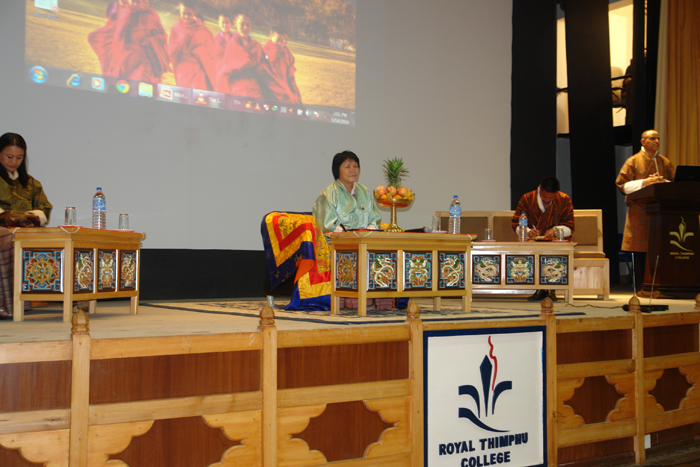As a part of the Distinguished Guest Lecture series, RTC was honored to have Lyonpo Dorji Choden, the first female Bhutanese Minister, talk to the students on, ‘Women in Development’ on 14 May. Her Excellency shared some of her personal experiences about being a women, a working mother, and the challenges of balancing her personal and professional life. She also shared some personal challenges faced in her career. Her Excellency stated that from time immemorial, there has always been differentiation between the roles of men and women , but in today’s Bhutan women today are given equal opportunities and have the same standing as men, be it in public affairs or Bhutan’s culture and traditions. The pointed out that during the last 5 decades of modernization, there have been a lot of changes on the social, economic and political front and the role of women has evolved along with such changes. Her Excellency said that with a good education system the participation of women in public spheres is definitely increasing. ‘Having equal women representation is an important factor and education is a social equalizer. No matter who you are, where you are from, you can take the opportunity if you have a good education’ said Lyonpo.
However, there are still a lot of gaps when it comes to positions at the decision-making level. Lyonpo shared current statistics demonstrating that women leaders in decision-making positions are very scarce, with only 6% of parliamentarians being women and few women at the local government as compared to men as well. Her Excellency stated that this low representation of women in government is a concern that every citizen must keep in mind. She said, ‘In this fast changing face of transformation, particularly in this democratic transformation, we cannot afford to have less representation from women. We have to get equal representation for a vibrant and inclusive democracy. Not just women, youth, the elderly and the disabled are also inclusive proof in a democratic setting”. Lyonpo also shared findings from a survey done during the 2011 local elections regarding some of the barriers that kept women from participating in the national elections. She said that a lot of initiatives are taken by the Govt, CSOs, and Commissions in addressing this issue but it still remains a major issue to ponder on.
“A family I believe is the fundamental unit that determines the health and strength of society and the nation. If we have men and women understand the interdependence, as interrelated human beings, as loving companions contributing equally to their families and society, living in harmony,there cannot be another place of happiness. This should be our unique way of how women contribute” said Lyonpo.

